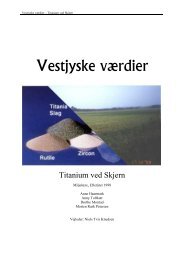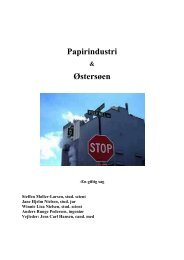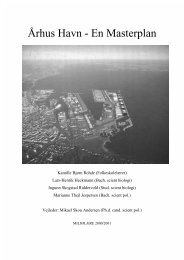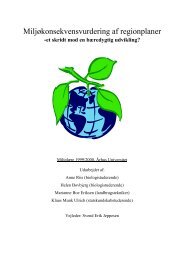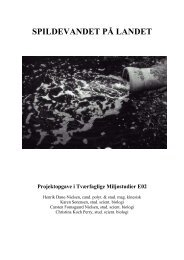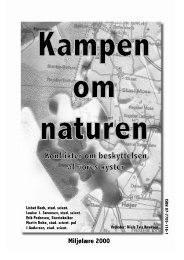University of Aarhus ECOTOURISM AS A WAY TO PROTECT ...
University of Aarhus ECOTOURISM AS A WAY TO PROTECT ...
University of Aarhus ECOTOURISM AS A WAY TO PROTECT ...
Create successful ePaper yourself
Turn your PDF publications into a flip-book with our unique Google optimized e-Paper software.
Ecotourism as a sustainable way to protect nature<br />
In short, economic benefits have been generated from different<br />
stakeholders in ecotourism activities. This may contribute significantly to<br />
maintenance costs <strong>of</strong> protected areas and would help to reduce the need for<br />
economic investment for conserving biodiversity from governments.<br />
Furthermore, the benefits generated from ecotourism particularly improve the<br />
livelihood <strong>of</strong> people. Specifically, it has raised the local living standard and<br />
made local people become more involved in conservation. Conservationists also<br />
believe that ecotourism may help protect nature and generate economic benefits<br />
for local residents (Honey, 1999, Amanda, 2001). David (2001) stated that<br />
“Without income flows, it may be more difficult to justify to some politicians<br />
and legislators the continued existence <strong>of</strong> protected natural areas strictly on less<br />
tangible grounds such as protecting watersheds, preventing climate change,<br />
preserving biodiversity or saving such areas for future generations”.<br />
2.6.2. Ecotourism as a benefit to local education<br />
In empirical activities <strong>of</strong> ecotourism, it is suggested that educating both<br />
local residents and visitors are necessary to get success in the ecotourism<br />
industry. Ecotourism has to become an integral part <strong>of</strong> sustainable ecotourism<br />
and a major secondary goal <strong>of</strong> management protected areas (Stefan, 1999). At<br />
the Conference on Sustainable Development <strong>of</strong> Ecotourism in Desert Areas,<br />
about 200 people from 21 different countries agreed that information and<br />
awareness raising in ecotourism should be concerned, particularly local<br />
populations, guides, foreign tour operators, accompanying staff, and tourists<br />
(Bouchdjira, 2002).<br />
Public involvement or public participation in the planning stage <strong>of</strong><br />
ecotourism projects is one <strong>of</strong> several ways to educate local residents. It is<br />
strongly recommended in tourism development projects (Diduck, 1999; Stephan,<br />
31



